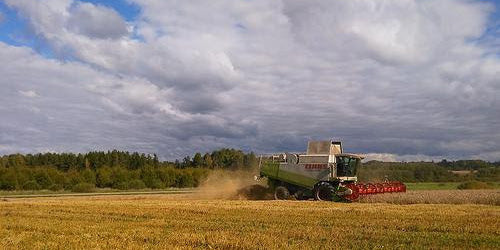
How to Manage Fire Risk During Fall Harvest Season
Share
How to Manage Fire Risk During Fall Harvest Season
The fall harvest season is upon us! During this time, farmers can find themselves working long hours in hopes of completing the extensive amount of work ahead. It tends to be dry during the harvest and without an abundance of water, farms are more susceptible to fire hazards and risks. Not to mention machinery being used extra, which can cause overheating, malfunctions in wiring, etc. That’s why we push our farmers to put together a fire protection kit with STOP-FYRE®.
Practice Farm Fire Safety Prevention
If you want to prevent farm fires, you’ll need to practice fire prevention at all times. Unfortunately, fires are unpredictable, especially on the farm. According to the U.S. Fire Administration, America saw 1,291,500 reported fires in 2019, which resulted in 3,704 deaths, 16,600 injuries, and $14.8 billion lost.
As a fire safety company, we find these statistics startling, but even more so when we think about all the fires in rural areas that go unreported. And, that is where our passion comes from.
If you prepare wisely and understand your risks, you are more likely to avoid potential loss. Let’s face it. Barns can burn up within minutes and fields can light ablaze faster than you can count to the number 10. Fire departments can take 30+ minutes to respond in rural areas which can seem like a lifetime while a barn or field burns. So be prepared.
Take Care of Your Machinery
To start a fire, you need heat, oxygen, and a fuel source. A farm has plenty of each. Combines and other harvesting machinery generate heat as they operate and are generally powered by gas – which we all know makes fantastic fuel for a fire. You also have hay, wood, cotton, silage, grass, and other highly-flammable materials around the farm, which can spread the fire.
Farms are filled with fire hazards, which is why we recommend farmers keep a STOP-FYRE® in their combine cab, at ground level with their machinery, and with the grain cart operator. For cotton operations, we recommend our STOP-FYRE® Cotton System. No matter what situation you are in, quick access to your STOP-FYRE® can prevent the spreading of a fire (and ultimately save tens of thousands of dollars, if not more) not to mention all the downtime that would have been spent on clean up, renting/borrowing a new machine, etc.
When preparing your machinery for the day’s harvesting, keep in mind that fire risk is significantly lower on a machine that is clean. Clean the engines and remove oil, caked-on grease oil, and crop residue. When starting up machinery, you can be extra safe by using a hand-held thermal camera to check for hot spots. Also, if you can, perform yearly maintenance on all your harvesting equipment to check for loose and skipping belts, hydraulic line leaks, and other electrical hazards.
When the work day is over, check again for lingering heat and always let your engine cool down first before refueling.
Cut Down Extra Vegetation
A great way to lower your fire risk is to get rid of its fuel source. On a farm, cutting down extra vegetation can prevent fires from spreading uncontrollably. This may also be the beginning of a responsible fire response plan, which we will talk about next…
Create an Emergency Fire Plan
Even if you are prepared, a fire can still break out at any time. Instead of being surprised, you can be prepared to enact a plan to minimize damage and injuries. Here are some basic tips to help you create your own emergency plan:
- Create a list of neighbors to call who can help during the fire.
- Have your local fire department’s phone number ready at all times.
- Prepare your farm with safety equipment such as first aid kits, gloves, and STOP-FYRE® extinguishers.
- Create a plan of action for when a fire starts.
We recommend that you invest in a quality fire extinguisher like our Standard and High Capacity STOP-FYRE® units. You don’t want to find yourself with more fire than extinguisher, especially in a situation where a fire can easily spread and cause damage, so invest in a High Capacity unit to make sure you have a good chance to eliminate the fire sooner rather than later.
As we said, we recommend including multiple fire extinguishers in strategic places to maximize your chance of putting out the fire and protect yourself. If you don’t know how many you need, you can contact one of our fire safety consultants here at AKE who can answer all your questions.
Conclusion
Fires are dangerous and often strike when we least expect it. That’s why the best way to prevent a fire is to be aware of the problem. Don’t let drop residue build up on your combine and be sure to check the engine to see if it is overheating. Before a fire starts, take the proper precautions. If a fire does start despite your efforts, always have a plan in mind to keep everyone safe and to prevent further damage.
Most importantly, remember that equipment is replaceable, you are not. If a fire is too hot for you to get within six feet of, evacuate the scene and let the fire department take care of the fire.
